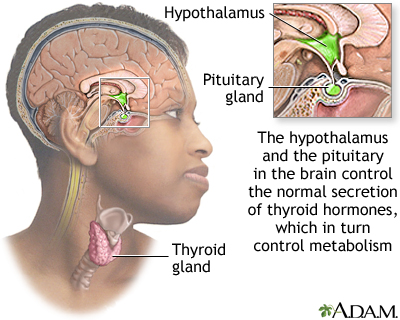What Is Thyroid Disease? thyroid disease is any disorder of the thyroid gland. The thyroid gland is in the front of your neck and makes hormones that control how your body uses energy, so a disorder can cause changes in mood, weight, and energy levels.
What Is Thyroid Disease? thyroid disease is a condition that results from the abnormal function of the thyroid gland. The thyroid gland is located at the base of the neck and affects many functions in the body.
Thyroid disease is a common condition, affecting as many as one in eight people. It can lead to swelling of the neck, hoarseness, and weight loss. The thyroid gland normally produces hormones that help regulate metabolism, body temperature and heart rate. Thyroid problems are usually treated with medication.
What Is Thyroid Disease? the thyroid gland is located in the upper neck, below the Adam’s apple. Its main responsibility is to produce hormones that regulate metabolism and growth. When the thyroid produces too much or too little of its hormones, you may suffer from a condition called hyperthyroidism (overactivity) or hypothyroidism (underactivity).
What Is Thyroid Disease?
Thyroid disease is a term used to describe conditions in which the thyroid gland malfunctions. It can be associated with an under-active thyroid, an overactive thyroid or both. One of the most common disorders that affect the immune system is known as Hashimoto’s disease and affects about 10% of the American population. The good news is that when detected early, many types of thyroid disease can be managed with safe and effective medications.
What Is Thyroid Disease? thyroid disease occurs when the thyroid gland, located in the neck, doesn’t work properly. The thyroid gland makes hormones that control how quickly the body uses energy, makes new proteins and controls how sensitive the body is to other hormones. When these hormones are out of balance, it can cause a number of symptoms
What Is Thyroid Disease? thyroid disease is a condition in which the thyroid gland does not produce enough hormone, or when the gland produces too much of a certain hormone.
Thyroid disease can affect the function of the thyroid gland, which is responsible for controlling metabolism. There are two types of thyroid disease: hypothyroidism and hyperthyroidism. Both conditions may cause symptoms such as fatigue, weight changes, dry skin, hair loss and depression. Hypothyroidism causes an underactive thyroid gland, while hyperthyroidism leads to overactive thyroiding tissue.
Is hypothyroidism a thyroid disease

Yes, hypothyroidism is a thyroid disease. You may have heard the term “hypothyroidism” used interchangeably with other thyroid disorders, particularly Hashimoto’s disease (chronic lymphocytic thyroiditis).
Read More : Why Meditation Is Important
Hypothyroidism is a condition where the thyroid gland does not produce enough hormones to regulate your metabolism, which affects the speed at which the body uses energy. Hypothyroidism has many different causes, including autoimmune diseases and exposure to certain medications.
Hypothyroidism is a common condition that can result from having an underactive thyroid gland, also called Hashimoto’s disease. Hypothyroidism causes the thyroid to produce less of a hormone that regulates normal body metabolism. It is diagnosed by testing for the levels of certain hormones in your blood.
Hypothyroidism, or underactive thyroid, is a common condition in which the thyroid gland does not produce enough of the hormone thyroxine (T4).
Hypothyroidism is a thyroid disease that occurs when your body doesn’t produce enough of the thyroid hormone. It can happen at any age, but it most often affects middle-aged people, especially women.
Where is thyroid located in body

What Is Thyroid Disease? the thyroid, also called the butterfly gland, is located below the voice box (larynx) in front of the trachea (windpipe). There, it wraps around a group of muscles in the neck called the laryngeal muscles. These muscles help you talk and swallow.
The thyroid gland is a butterfly-shaped organ located in the front of the neck, just below the Adam’s apple (or larynx). The thyroid controls metabolism and affects how the body functions.
The thyroid gland is located in the front of the neck, just below the Adam’s apple. It does not have a bone behind it to protect it from impact. Rather, it is surrounded by muscles that must contract to make way for swallowing or speaking.
The thyroid gland is located in the neck just above where the Adam’s apple is. Above it are two small lumps, known as the Adams’ apple.
What Is Thyroid Disease? thyroid is an organ. It is located in neck and controls the metabolism of our body. It produces the hormone thyroxine that regulates the availability of energy in our body, which is essential for normal growth, development and working of all our organs
The thyroid gland produces the thyroid hormones which are in charge of regulating the metabolism and affect numerous key body functions. The most common problem with the thyroid is an underactive (hypothyroid) or overactive (hyperthyroid) gland, which can lead to a host of symptoms from fatigue and weight gain to irregular heartbeat.
What problems does thyroid cause

Thyroid disease can cause fatigue, depression, and weight gain. The thyroid gland produces hormones that help regulate metabolism and control body temperature.
thyroid disease can cause issues in almost every part of your body. It affects your metabolism, which controls how your cells burn energy and make new proteins.
thyroid disease can cause breathing problems, difficulty sleeping, changes in mood and weight gain.
What Is Thyroid Disease? Thyroid disease is a group of conditions caused by problems with the thyroid gland. The thyroid affects how your body uses energy, so problems often result in changes in your mood, weight, and metabolism. Typical symptoms include feeling tired and weak, weight gain or loss, memory changes, menstrual irregularities, and an increased need to urinate at night.
Thyroid disease is a common endocrine disorder that can lead to a variety of symptoms. The thyroid gland, located at the base of your neck, produces hormones that control your heartbeat and regulate many other functions throughout the body. When this gland does not produce enough or makes too much hormone, a disruption in the body’s natural balance can occur.
Is hypothyroidism considered thyroid disease

Hypothyroidism is the most common thyroid disorder in the U.S., accounting for more than 10 percent of all cases of thyroid disease. Hypothyroidism occurs when your thyroid gland secretes too little of the hormone thyroxine, which regulates metabolism and affects every organ system in your body.
Hypothyroidism is a medical condition in which the thyroid gland functions below its normal capacity. Hypothyroidism, also referred to as low-functioning thyroid (LFT) or hypothyroidism, can cause weight gain, fatigue and depression.
Hypothyroidism is a condition in which the thyroid gland does not produce enough hormones. This hormone is essential for controlling metabolism and the body’s ability to function normally. It can cause symptoms such as fatigue, mental confusion, and weight gain.
What Is Thyroid Disease? Thyroid disease is a common diagnosis that can affect your daily life. Hypothyroidism is a common type of thyroid disease, where your thyroid gland doesn’t produce enough of the hormone thyroxine. This causes other symptoms in your body that may negatively impact your health, work and relationships if left untreated.
How is thyroid disease diagnosed

What Is Thyroid Disease? Thyroid disease is often something that causes much confusion in the medical community, as well as among patients. A common thyroid symptom is called a “goiter,” and not all goiters indicate a problem with the thyroid.
Thyroid disease is diagnosed through a physical exam, hormone tests, and if necessary, through imaging tests.
Thyroid disease is typically diagnosed with a complete medical history and physical examination, as well as lab tests.
If you think you may have a thyroid disorder, the first step is to talk with your doctor. A physical examination and blood tests can help determine if your symptoms are due to an overactive or underactive thyroid gland.
Thyroid disease is often diagnosed by the process of elimination. Your doctor will first determine whether you have or don’t have hypothyroidism or hyperthyroidism based on a number of factors, including your key signs and symptoms, your medical history, your hormone levels and the results of blood tests. The blood test used most frequently to assess thyroid function is called a thyroid-stimulating hormone (TSH) test
Thyroid disease is caused by abnormal or excessive production of thyroid hormones, which can disrupt your body’s metabolism. The most common form is hypothyroidism, in which your thyroid doesn’t produce enough T4 and T3. Hashimoto’s disease is the most common cause of hypothyroidism worldwide. Hyperthyroidism occurs when your thyroid produces too much hormone (hyperactive), which leads to symptoms like weight loss and rapid heart rate
How common is thyroid disease

Hypothyroidism is the most common thyroid disorder in the U.S., accounting for more than 10 percent of all cases of thyroid disease. Hypothyroidism occurs when your thyroid gland secretes too little of the hormone thyroxine, which regulates metabolism and affects every organ system in your body.
Thyroid disease is a common condition, affecting as many as one in eight people. It can lead to swelling of the neck, hoarseness, and weight loss. The thyroid gland normally produces hormones that help regulate metabolism, body temperature and heart rate. Thyroid problems are usually treated with medication.






More Stories
Protein on a Budget: Best Affordable Drinks in 2025
Go Green: Top-Rated Plant-Based Protein Drinks
Arthroscopy Implants Then and Now: A Journey Through Innovation